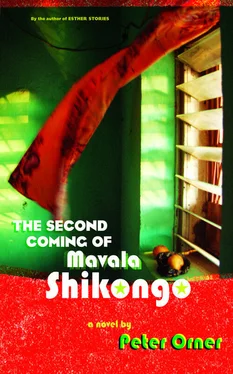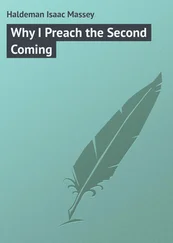I wonder now if fear would have been easier for him to take. That man standing there in those raggy shoes, bewildered. He seemed to like Pohamba and me. He used to come by the quarters with some of his home brew and share it with us. But in the end we weren’t any more helpful to him than Festus.
Even Mavala said it was probably true about Abram, and if not that, something else. She was writing a lesson plan, a notepad propped on her knees. Sometimes she was practical with our time. I groped her. She fended me off.
“What do you mean?”
“Oh, anything. Maybe he hit his wife. Maybe he kicked a dog.”
“So he pays for it this way?”
She didn’t look up from her writing.
“There’s been worse injustice, no?”
Thursday, and the skeletal goats wander into the grassless courtyard alone. The last we hear of Abram, he’s working day labor at the gravel pit near Pawkwas.
Antoinette would say that we’d been cavorting in the stench of sin. She wouldn’t be surprised, or blame us. She expected it. She expected it of everybody. What else do people do but ultimately degrade themselves? She’d say we have as much control over our sinning as we do against the wind, because we are born to it — unless every day, every hour, every minute, we are vigilant. She made no claims to being any better. She was only a humble servant of the Lord and of boys. Because defeating the devil is merely work. And since we were lazy, since we wanted only to enjoy, it was only a matter of time before we would cave in to his desires. Afternoons of shut-up rooms and Mavala and me out there. You couldn’t call it an escape, because we didn’t go far and we didn’t go long and we didn’t close our eyes and we didn’t care about our knees in the sand or the rocks in our backs, or even the sun-dried goat shit, nothing.
“Like a couple of baboons in the veld.”
“As if this farm didn’t have any beds!”
“The girl who fought in the struggle, the one with the baby and —”
“Yesssss! I remember. And the volunteer. From where was that volunteer?”
Us becoming a story, then, if not much of one — we were only an hour a day on weekdays, an hour and fifteen minutes if we were bold. Still, something people might tell years from now just because it was something to tell. It made us feel slightly famous.
What did the kid see when he saw us fucked-out, sweat-glazed, the sun lashing us and we’re too tired to move? The last thing I remember before we slept was that Mavala splayed her toes and grasped some sand and threw it with her foot at Grieta — and then we both were out. We had it down. Eight minutes of sleep before Tomo air-raided us. And then the footfall, and I wake up and see the kid running backward, the face of my Standard Six Magnus Axahoes — disgusted? sad? — and then him whirling around, his untucked shirt flapping like a cape.
“It doesn’t matter,” she says.
“No. Why would it matter?”
Dead center of a Sunday, Pohamba singing in the shower, doorless shower, trickly spigot. Hot water rare. It spouts forth now only in the middle of the day, when it’s the last thing you want, but since it’s so rare, you’ve got to love it. The rapture of wasting water in a drought. Pohamba slathered up and screeching Please, please, please, please.
On a rock near the spigot, a Standard Four waits, a bored valet. Over his arm, a towel; in his hand, a cup of cold tea.
Lonely hot afternoon and our shoes, all four of them, in a line on the grave. Us shoulder to shoulder on the tablecloth.
She tries to scratch her back.
“Will you?”
I shift around and scratch her.
“Harder,” she says.
“You go,” I say.
“What?”
“Tell something. Anything. What about your mother?”
“I haven’t seen her in five years.”
“Tell me —”
“She loves handbags. Or at least she used to.”
“Handbags.”
“Yes, my mother always said a lady should never be seen in public without a handbag. Even at the market at Ondangwa, where there weren’t any of the ladies she was talking about. What ladies was she talking about? My sister and I walked around like queens because my father was an assistant headman, because he worked in an office. A sell-out, my father. But I loved the market. Bream fish, barbell fish, sour milk. Dry beans, cassava, cabbage. The fat koeks in the bubbling oil. All I wanted on earth was a fat koek in greasy paper. That first bite was like eating a peach, only better. And one was never enough. Sometimes Tuyeni gave me half of hers.”
“Tell me more.”
“Don’t stop. Keep scratching.”
“Go on.”
“She never let go of our wrists. Always so many men around. And they letched the assistant headman’s daughters. Men. There are always, everywhere, so many men. Have you noticed?”
“I notice here.”
“And there was a war, and still my mother walked around as if she never heard of it. Four years later I was gone. Tuyeni says after I left, my mother wouldn’t be seen in the market. Went off where? To fight for whom? An assistant headman’s daughter? ”
“And Tuyeni?”
“What about her?”
“Your sister.”
“Wife now, not sister.”
Sharing a bag of crisps. I’m trying to share. Mavala’s munching most of them, in between repainting her toenails. I’m loving the smell of the polish.
“Nothing else?” she says. “Your entire life?”
“All right. I remember running through an airport once. I was about to miss a plane. There was a woman in front of me, young, she had a kid with her. Maybe he was five. She was late for the same plane and was trying to run with the kid, but it wasn’t working. I came up behind them and took the kid’s other hand, and we held him up in the air as we ran. The kid was loving it, him flying and he hasn’t even gotten on the plane yet. The whole time we didn’t say a word.”
“This is what you remember of your life?”
“Basically.”
“Did you make it to the plane?”
“Yes.”
“Then what happened?”
“That was it. She thanked me. I think I bowed. I never saw her again.”
“You bowed?”
“Why not? Why not bow?”
“Daddy, husband, alone — how long did that take?”
“About four minutes. Come back with me.”
“Where?”
“I’ll get a job, go to graduate school. I’ve got to do something.”
“Me? What will I do?”
“You could go to school. You said you wanted to go back to school. You could study accounting again.”
“Tomo?”
“Of course.”
“Our volunteer has gone amuck.”
“Why?”
“Start with the visa problem. The other thing is, well, the kid does hate you.”
“I knew it. The whole time —”
“A joke, Davey! He bites what he loves.”
“So we get married. Goas could use a wedding.”
She nearly hyperventilates, gulps air and holds her stomach, writhes around in the sand. And Tomo — as if he hasn’t been asleep, as if he’s heard every word — starts right then to rev up the siren on the other side of the tombs.
“Hand me the polish.”
“Why?” she says.
“I want to smell it harder.”
“Don’t be jealous.”
“Of who?”
She looks away. Then, with her eyes half-closed, kisses me.
“Tell me.”
“Isn’t it time?”
Читать дальше












